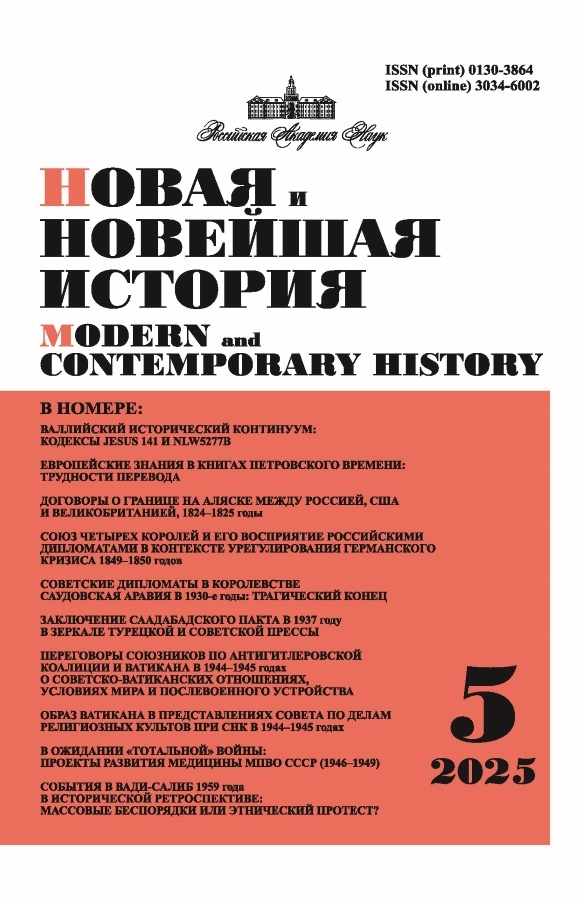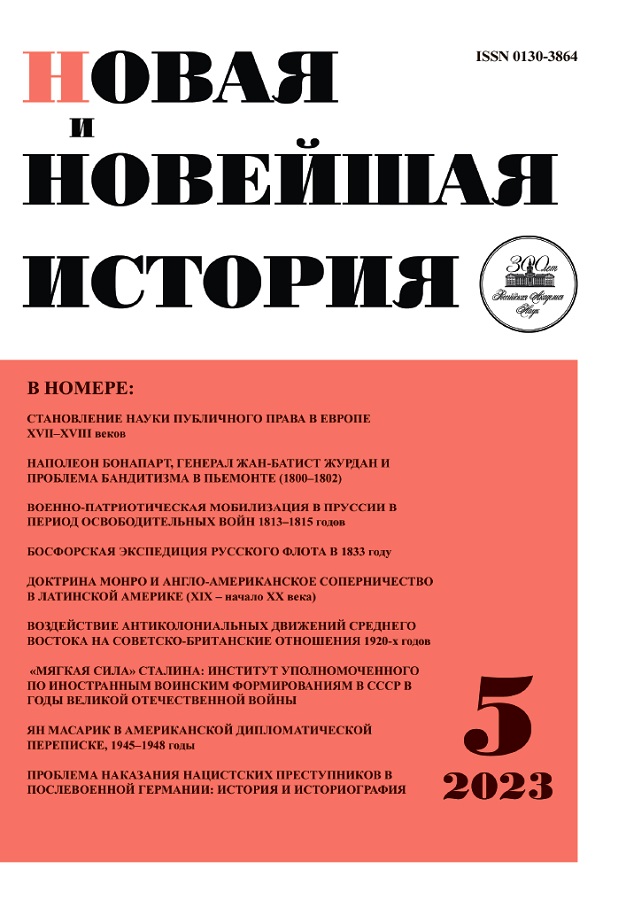«Отвратительный сионизм, Израиль ‒ не решение вопроса». Диалектика советского и национального в еврейских эго-документах 1970–1980-х годов
- Авторы: Зеленина Г.С.1,2,3
-
Учреждения:
- Московский государственный университет им. М.В. Ломоносова
- Российский государственный гуманитарный университет
- Российская академия народного хозяйства и государственной службы при Президенте РФ
- Выпуск: № 5 (2023)
- Страницы: 198-215
- Раздел: Сообщения
- URL: https://snv63.ru/0130-3864/article/view/670950
- DOI: https://doi.org/10.31857/S013038640024207-5
- ID: 670950
Цитировать
Полный текст
Аннотация
Основываясь на позднесоветских еврейских эго-документах: мемуарах, дневниках и письмах, прежде всего на корпусе (авто)биографических сочинений о жизни одного ленинградского журналиста, автор исследует обсессивные размышления своих героев об антисемитизме и сионизме, вызванные острым диссонансом между искренне усвоенной ими коммунистической идеологией интернационализма и повсеместной практикой антисемитизма, а также между советским патриотизмом и еврейской памятью, еврейской солидарностью и соблазном эмиграции в Израиль. Исследование не предназначенных для печати эго-документов «обычных» людей, помимо проникновения в их внутренний мир и возможной экстраполяции полученных наблюдений на советское еврейское большинство, позволяет также объяснить или верифицировать искренность позиций общественных деятелей и литераторов еврейского происхождения, клеймивших иудаизм и сионизм, таких как драматург и публицист Цезарь Солодарь, поэт и главный редактор журнала «Советиш геймланд» Арон Вергелис, автор критических научно-популярных книг об иудаизме Моисей Беленький и др. Эго-документы позволяют проследить не только советские, но и еврейские истоки позднесоветского антисионизма, восходившего к позиции бедных слоев местечкового общества, склонявшихся к социализму, а сионизм ассоциировавших с враждебной им буржуазией. Статья также отчасти полемизирует, отчасти дополняет существующую историографию по позднесоветской еврейской идентичности, основывающуюся преимущественно на постсоветских интервью или опыте эмигрантов и потому склонную бинарно упрощать картину, сводя многообразие идентичностей, взглядов и поведения либо к «тонкой культуре»/«символической этничности», либо подспудному национализму и эмиграционным настроениям, подаваемым как естественные и самоочевидные.
Ключевые слова
Об авторах
Галина Светлояровна Зеленина
Московский государственный университет им. М.В. Ломоносова; Российский государственный гуманитарный университет; Российская академия народного хозяйства и государственной службы при Президенте РФ
ORCID iD: 0000-0001-9411-4102
Российская Федерация, Москва
Список литературы
- Беленький М.С. «Талмуд» в свете науки. М., 1960.
- Беленький М.С. Иудаизм. М., 1966.
- Вайскопф М. Писатель Сталин. М., 2001.
- Гейзер М. История жизни генерала Драгунского // Лехаим. 2000. № 98 (6). С. 24–31.
- Зеленина Г.С. «Гевалт! Это же простые базарные люди…»: от местечковости к интеллигентности // Семиотика поведения и литературные стратегии. Лотмановские чтения – XXII / ред.-сост. М.С. Неклюдова, Е.П. Шумилова. М., 2017. С. 322–356.
- Казаков Е. В поисках «советского еврейского»: позднесоветская национальная политика // Неприкосновенный запас. 2018. № 122 (6). С. 190–215.
- Кокотов Б.Л. Записки о родителях // URL: https://zemelah.online/documents/boris-kokotov-txt1 (дата обращения: 10.01.2023).
- Кокотов Б.Л. Записки о себе и Семье // URL: https://zemelah.online/documents/boris-kokotov-txt2 (дата обращения: 10.01.2023).
- Кокотов Л.Г. Моим детям, внукам, правнукам // URL: https://zemelah.online/documents/kokotov-memuary (дата обращения: 10.01.2023).
- Копелев Л. О правде и терпимости. New York, 1982.
- Костырченко Г.В. Тайная политика: от Брежнева до Горбачева. Ч. 1–2. М., 2019.
- Кривулин В., Пивовар Ю. И это все в одной судьбе. О дважды Герое Советского Союза, генерал-полковнике Д.А. Драгунском. М., 1986.
- Митрохин Н. Русская партия. Движение русских националистов в СССР, 1953–1985 годы. М., 2003.
- Смола К. Изобретая традицию: современная русско-еврейская литература. М., 2021
- Солодарь Ц.С. Дикая полынь. М., 1977.
- Хархордин О. В. Обличать и лицемерить: генеалогия российской личности. М.; СПб., 2002.
- Эстрайх Г. Арон Вергелис: главный еврей послегулаговского социализма // Архив еврейской истории. 2007. Т. 4. С. 125–144.
- Эстрайх Г. Еврейская литературная жизнь Москвы, 1917–1991. СПб., 2015.
- Bemporad E. Becoming Soviet Jews: The Bolshevik Experiment in Minsk. Bloomington, 2013.
- Bemporad E. Behaviour Unbecoming a Communist: Jewish Religious Practice in Soviet Minsk // Jewish Social Studies (new series). 2008. Vol. 14. № 2. P. 1–31.
- Borgen Gjerde А. Reinterpreting Soviet “Anti-Zionismˮ: An Analysis of “Anti-Zionistˮ texts published in the Soviet Union, 1967–1972. Master of arts thesis. Oslo, 2011.
- Borgen Gjerde А. The logic of anti-Zionism: Soviet elites in the aftermath of the Six-Day War // Patterns of Prejudice. 2018. Vol. 52. P. 271–292.
- DiAntonio R., Glickman N. Tradition and Innovation: Reflections on Latin American Jewish Writing. New York, 2012.
- Diasporas and Exiles: Varieties of Jewish Identity / ed. H. Wettstein. Berkeley, 2002.
- Estraikh G. Aron Vergelis: The perfect Jewish homo sovieticus // East European Jewish Affairs. 1997. Vol. 27. № 2. P. 3–20.
- Frankel J. The Soviet regime and anti-Zionism: an analysis // Jewish Culture and Identity in the Soviet Union / eds Ya. Ro'i, A. Beker. New York, 1991. P. 310–354.
- Friedgut Th. Soviet anti‐Zionism and Antisemitism – another cycle // Soviet Jewish Affairs. 1984. Vol. 14. № 1. P. 3–22.
- Gershenson O. A Phantom Holocaust: Soviet Cinema and Jewish Catastrophe. New Brunswick, 2013.
- Gitelman Z. A Century of Ambivalence: The Jews of Russia and the Soviet Union, 1881 to the Present. Bloomington, 2001.
- Gitelman Z. The meaning of Jewishness in Post-Soviet Russia and Ukraine // Contemporary Jewries: Convergence and Divergence / eds E. Ben Rafael, Y. Gorni, Y. Ro'i. Leiden, 2003. P. 194–215.
- Gitelman Z. Thinking about being Jewish in Russia and Ukraine // Jewish Life After the USSR / eds Z. Gitelman, M. Glants, M.I. Goldman. Bloomington, 2003. P. 49–60.
- Halfin I. Terror in My Soul. Communist Autobiographies on Trial. Cambridge (Mass.), 2003.
- Hellbeck J. Revolution on My Mind. Writing a Diary under Stalin. Cambridge, 2006.
- Korey W. Russian Antisemitism, Pamyat, and the Demonology of Zionism. London; New York, 1995.
- Mendelsohn E. On modern Jewish politics. Oxford, 1993.
- Murav H. The Music from a Speeding Train: Jewish Literature in Post-Revolution Russia. Stanford, 2011.
- Paperno I. Stories of the Soviet Experience: Diaries, Memoirs, Dreams. Ithaca, 2009.
- Remennick L. Russian Jews on Three Continents: Identity, Integration, and Conflict. New Brunswick (NJ), 2012.
- Shternshis A. Soviet and Kosher: Jewish Popular Culture in the Soviet Union, 1923–1939. Bloomington, 2006.
- Slezkine Yu. The USSR as a Communal Apartment, or How a Socialist State Promoted Ethnic Particularism // Slavic Review. 1994. Vol. 53. № 2. P. 414–452.
- Veidlinger J. In the Shadow of Shtetl: Small-Town Jewish Life in Soviet Ukraine. Bloomington, 2013.
- Wiesel E. The Jews of Silence: A Personal Report on Soviet Jewry. New York, 1966.
- Wistrich R.S. From Ambivalence to Betrayal: The Left, the Jews, and Israel. Lincoln, 2012.
- Zeltser A. Unwelcome Memory: Holocaust Monuments in the Soviet Union. Jerusalem, 2018.
Дополнительные файлы











